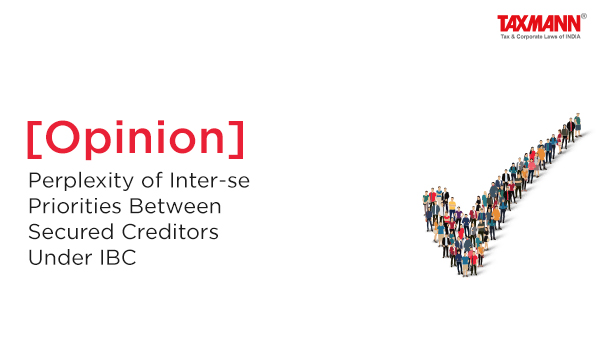
Siddhant Asthana – [2024] 158 taxmann.com 289 (Article)
Introduction
In accordance with principles derived from both common law and corporate finance, it is established that senior debt takes precedence over subordinate debt. When a business seeks financing using the same assets as collateral from multiple creditors, it can establish a preference for one creditor over another through a preferential charge arrangement.
The Insolvency and Bankruptcy Code, 2016 (hereinafter Code) and the Companies Act, 2013 define “charge” as an interest or a lien created on the property or assets of a company, or any of its undertakings or both, as the case may be, as security and includes a mortgage. A charge created by the company can be an exclusive charge or a pari passu charge or a subordinate/priority charge. The distinction between various charge holders on the same asset or property has been recognized by the Indian Jurisprudence on the basis of the common law Doctrine of Priority of Charges. The maxim, “Qui prior est tempore potior est jure” which means “who is prior in time is better in law”, in case of an inter-se priority of charge amongst charge-holders on a particular asset of a debtor, denotes that the amount so realized from the sale of such asset must first be paid to the first charge holder towards satisfaction of its debt and only the balance amount, if any, must be paid to the subsequent charge holder.
The Code does not distinguish between the secured creditors holding the first-charge and subordinate-charge or an exclusive charge and a pari-passu charge when it comes repaying the secured creditors and this remains an area of contention in the insolvency regime taking different views on the distribution of proceeds. In the Indian context, the primary focus during insolvency proceedings is on the amount owed to creditors rather than the rights and priorities of secured creditors. This is somewhat different from international insolvency regimes, which often prioritize the protection and enforcement of security interests held by creditors.
Cardinal principle on treatment of security interests under Indian law
Before the Insolvency Code came into effect the priority of claims was governed by other statutes like the Transfer of Property Act, 1889 (hereinafter TPA), the Companies Act, as well as the SARFAESI Act. Section 48 of the TPA provides that if a person attempts to transfer rights in the same immovable property at different times and these rights cannot coexist or be fully exercised together, any rights created later will be subject to the rights established earlier, unless there is a specific contract like an inter creditor agreement or a reservation favouring the later transferees. The first charge-holder’s claim takes priority over the second charge-holder, and in cases where debts are owed to both, the first charge-holder has to be repaid before any payment is made to second charge-holder. This rationale has been adopted by the various commercial laws of the country and well recognised and reiterated by the Indian Courts.
The Hon’ble Supreme Court in ICICI Bank Ltd. v. SIDCO Leathers Ltd. while adjudicating the matter concerned with Sec. 529 and 529 A of the Companies Act, 1956, which provided for the liquidation mechanism, opined that although the debts due to the workmen and the secured creditors were to be treated at par or pari passu with each other, this does not signify that the inter-se priority amongst the secured creditors is excluded. The Court clarified that since the provisions of the 1956 Act did not explicitly mention or reject the rule of priority amongst the secured creditors, the general rule under S. 48 of the TPA applies. It mentioned that if it was the intention of the legislature to deprive the first charge holders of their right enshrined under the common law and the general law under the TPA, it would have explicitly expressed it in the provisions of the Act.
The author submits that Section 529 of the Companies Act, 1956 and Section 52 of the Insolvency and Bankruptcy Act, 2016 are similar in nature, talking about the waterfall mechanism during liquidation and should be interpreted alike.
Click Here To Read The Full Article
The post [Opinion] Perplexity of Inter-se Priorities Between Secured Creditors Under IBC appeared first on Taxmann Blog.
